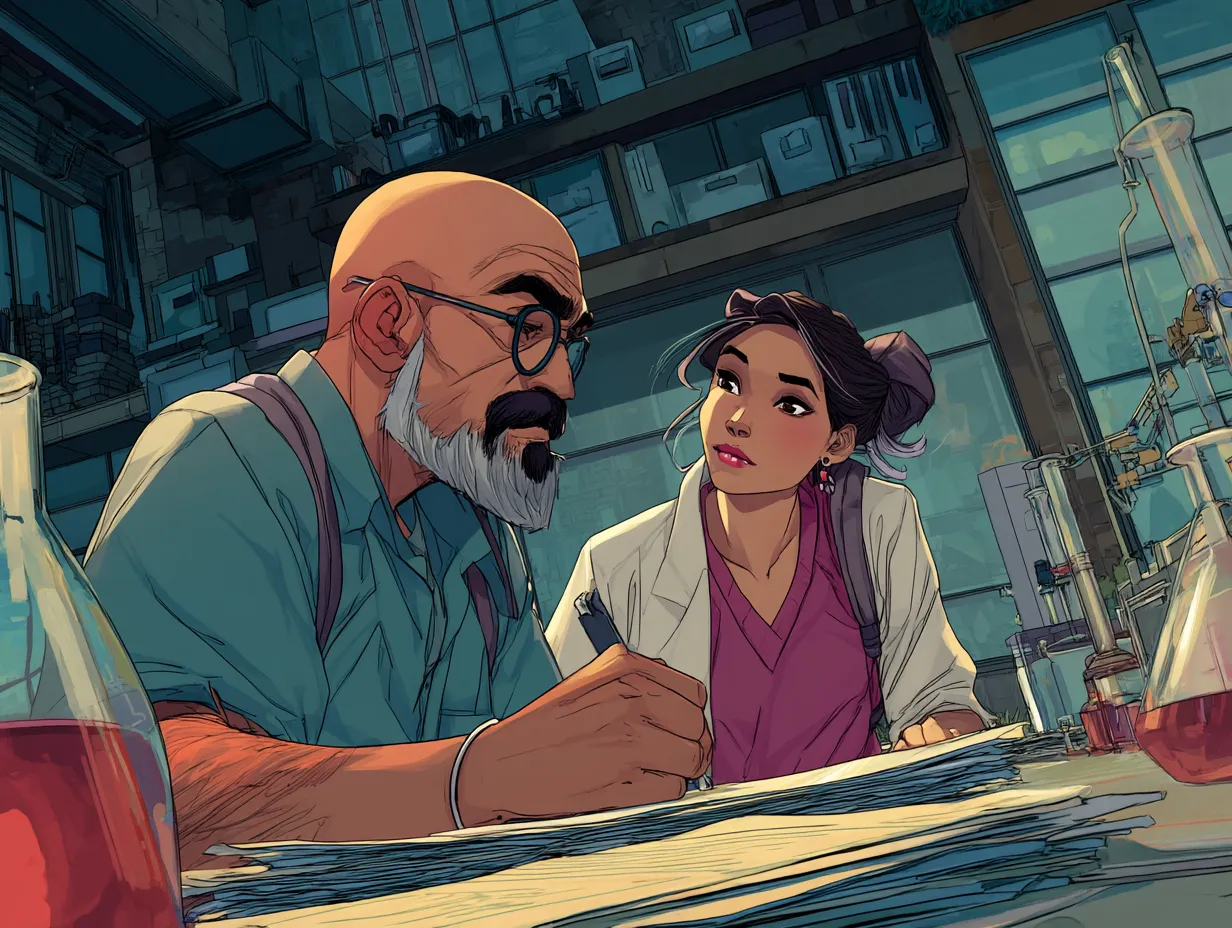Taking Organic Chemistry For The First Time?
Stay awhile, and listen!
~Deckard Cain
The “Why” Part
Are you taking organic chemistry this semester, or maybe next, and already dreading it because of all the horror stories? You’re not alone. After working with students for over 20 years, I can tell you: fear of orgo is almost universal. And that fear often becomes a self-fulfilling prophecy—unless you snap out of that losing mindset early.
Is organic chemistry hard? Absolutely. It will likely be the hardest class you’ve taken so far. But it’s not the monster people make it out to be.
Why Are You Even Taking Organic Chemistry?
Let me ask you something: why are you taking this course?
The simple answer is probably “because it’s required” for premed, pharmacy, biology, or some other health-related major. Fair. But let’s unpack that a bit.
You can probably understand why English is required—so you can write and speak coherently. Math? Because you need to calculate and analyze data. But organic chemistry? You’re not going to be synthesizing drugs in a lab or mixing compounds like an apothecary.
So why do schools insist you take it? Yeah, I’ve talked about that before. But here’s a slightly different spin for you.
If you ask most professors, they’ll say some version of: “Organic chemistry teaches you how to learn hard material.” And sure, there’s truth to that. But let’s be honest—that’s kind of bullshit we just keep repeating. If the goal is to teach you how to study, why not do that with something directly relevant, like physiology or anatomy?
What Organic Chemistry Actually Is
Let’s zoom out for a second.
Organic chemistry isn’t just “the study of carbon compounds,” that definition is outdated. Modern organic chemistry is the study of covalently bound molecules and the methods used to build them. And since covalent compounds make up most of the physical world around you, this means organic chemistry is basically the language of the molecular world.
From the plastic in your phone to the caffeine in your coffee to the light-sensitive proteins in your eyes—it’s all organic chemistry. If you don’t have a basic understanding of how this world works on a molecular level, you’re operating with a serious blind spot.
It’s like trying to understand calculus without knowing algebra.
Likewise, without orgo, you won’t really understand how drugs interact with receptors, how metabolism works, or how molecular structure affects biological activity. You can memorize terms in physiology or cell bio, sure. But you won’t really understand the why behind them.
But Do I Need to Know Mechanisms?
Let’s say you’re with me so far. You get that the fundamentals matter. But what about mechanisms? Transition states? Arrow pushing?
That’s just for chem majors, right?
Not quite.
Mechanisms help you understand how things happen and under what conditions. For example, why are so many prodrugs esters? Because esters are stable enough to survive the pill bottle but break down under acidic or enzymatic conditions in your body. Think aspirin, enalapril, lovastatin, bacampicillin, valpromide—all ester prodrugs. Without a basic grasp of acid-base chemistry and ester hydrolysis, you’d have no clue why those forms are used. Or, why those drugs must be administered orally, and if you stick them in the body some other way, they won’t be effective. No magic box here! Just your understanding of the ester hydrolysis mechanism.
And no, you’re not going to need to draw the full hydrolysis mechanism on your medical board exams. But understanding the concept gives you insight into drug delivery, metabolism, and pharmacokinetics.
What About Synthesis? That’s Not Relevant, Right?
Synthesis feels like something only a chemist would ever need. But your professor keeps assigning synthesis problems like they’re the holy grail. Why?
Because synthesis trains your brain to work with incomplete information, choose the right tools, and work within constraints—exactly the kind of thinking you’ll need in medicine, research, or any analytical profession.
Organic chemistry gives you tools. Synthesis problems teach you how to choose and apply those tools strategically. That’s not just a chemistry skill—that’s a thinking skill.
As a doctor, you’ll face incompatible drugs. As a biologist, you’ll juggle experimental trade-offs. You won’t always have the perfect answer, rather, you’ll need to work with what’s available. That’s exactly what orgo trains you to do.
But No One Remembers This Stuff!
Most doctors I talk to say they don’t remember a thing from organic chemistry. And yeah, that’s fair. In fact, many of my students have doctor parents who aced orgo, but can’t help their kid with it now.
You won’t remember every reaction. You won’t use every reagent. But you will retain the mental habits: the pattern recognition, the logical structuring, the problem-solving framework. And those habits will stick with you for life.
Think of it like learning how to use the machines at the gym. Once you learn how to use them correctly, you can start customizing your routine, adapting as needed. Organic chemistry teaches you how the machines work. And once you know that, you can improvise, explore, and work smarter down the road.
So no, you’re not learning organic chemistry just for the sake of it. And you’re definitely not learning it just to prove you can study hard.
You’re learning it because it lays the foundation for every molecular interaction you’ll encounter in your future field.
And that foundation? It’s the difference between knowing the words, and speaking the language.
The “How” Part
I know the “why” portion of this post was long. But I wanted you to truly understand what you’re doing here. Now that we’ve got that sorted, let’s get into how to not just survive organic chemistry, but actually crush it on your first try.

Do You Need a Tutor?
Let’s address the elephant in the room right away: do you need a tutor to succeed in organic chemistry?
No. You don’t.
I know, sounds weird coming from a professional organic chemistry tutor on OrganicChemistryTutor.com. But I promise you, if you’re willing to put in the work, you can succeed without one.
Do you want a tutor? Now that’s a different question. A good tutor can save you hours of study time, help you find your weak spots, and get you back on track when you’re lost. So yes, you probably want a tutor.
And no, this isn’t some reverse psychology ploy to get you to hire me. My goal is to help you succeed. Whether that’s with me, someone else, your school’s resources, or free material online—I don’t care. If you get to where you want to be, I’m happy. That’s Hess’s Law in action: the value of a state function depends only on the start and end points, not the path in between. (Did that trigger some general chemistry PTSD? Good. Focus up.)
The Gen Chem Approach Won’t Work
Organic chemistry plays by different rules. If you think you can use the same study habits you used for general chemistry, you’re in for a rude awakening.
Gen chem is algorithmic and compartmentalized. One chapter has little to do with the next. Organic chemistry is cumulative and conceptual. Every new topic builds on the last.
In gen chem, you can skip a topic and cram before the test. In orgo, if you miss a concept—you’re done. I’ve seen it too many times: students feel fine early in the semester, but by the end, it feels like the professor is speaking in alien hieroglyphs. Nine times out of ten, it’s because they missed a key concept early on and never fixed that crack in the foundation. Once the load gets heavier, the whole structure collapses.
The Three Pillars of Success in Organic Chemistry
1. Own Your Understanding
Keep constant tabs on how confident you are with each topic. Here’s your action plan:
- Get a dedicated tracking page and keep it in your orgo binder.
- Every time you start a new topic, write it down and rate yourself 0–5 on your comfort level.
- Reassess every few days. Do a couple of practice problems to test yourself.
- Revisit older topics weekly. If you’re slipping—fix it now, not before the exam. Organic chemistry takes time to “sink in” so last minute studying doesn’t work.
Here’s how I break down comfort levels:
0 = I have no idea what that even means
1 = I don’t know how to do it even with my notes
2 = I can do examples with notes
3 = I can do examples without notes, but I still mess up
4 = I rarely make mistakes, and I can kinda explain it
5 = I’m solid. I almost never mess up and I can teach it to others
Be honest. You’re not impressing anyone but yourself.
2. Prioritize Active Practice
When your instructor says to study 15–20 hours per week, they mean doing problems, not watching videos or rewriting notes.
Rewriting notes, re-reading chapters, watching lectures… that’s all recognition. Recognition makes you feel like you know the material, but you don’t. Studying means making your brain work. You need to practice until you can generate the answer yourself.
Try this test: pick up a magazine you read last week and flip through it. Looks familiar, right? But can you predict the first sentence of the third paragraph on page 6? Of course not. That’s recognition.
Now look at a paper you wrote last semester. Bet you can recall what comes next in each paragraph. That’s recall. That’s active engagement. That’s what we’re after.
3. Come Prepared
If you’re hearing about a concept for the first time during lecture, you’re doing it wrong.
Use your syllabus. If it lists upcoming topics, pre-read the relevant textbook sections. If it doesn’t, ask your professor or just follow the textbook chapter sequence. That $400 brick has some use after all.
Pre-reading gives your brain a rough sketch. Then, during lecture, you can fill in the details instead of scrambling to stay afloat. I have another article about pre-reading your textbook here.
Watch Carefully, Then DO
Watching others solve problems is not the same as doing them yourself. If you’re watching a video, pause when a new problem comes up. Try it yourself. Then unpause and compare.
Observation only works when you already have the skill. I can’t learn violin by watching Vanessa Mae videos. Personally, I don’t even know how to hold the damn thing! Watching is a supplement, not a substitute.
Do → Compare → Learn → Improve → Repeat.

Nuggets of Wisdom (a.k.a. Things You Need to Hear)
- Flashcards don’t work. You’re not gonna make them right anyway, so just don’t. I did write a short post on how to make flash cards for organic chemistry ages ago if you insist on using them. You can check it out here.
- Memorization doesn’t work. Even if you think you’re good at it.
- Going to office hours without questions is a waste of time. What is a good question? Check out this post.
- Going to lectures unprepared is a waste of time.
- Cramming before the test won’t work.
- Relying on “tricks” and “shortcuts” is shooting yourself in the foot.
What works? Everything before this section.
So get your butt in gear, stock up on some elbow grease, and get ready to work. It’s gonna be a tough semester, but when you’re done, it’ll feel better than a pumpkin spice latte on a crisp October morning. And unlike that latte, this win will actually last.

